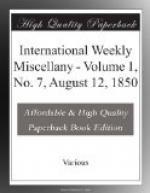In addition to the honor of being President of the Museum of his county town—in which there is an admirable portrait of him—Mr. Kirby was Honorary President of the Entomological Society of London, Fellow of the Royal, Linnaean, Geological, and Zoological Societies of the same city, and corresponding member of several foreign societies.
* * * * *
The death of REV. DR. GRAY, Professor of Oriental Languages in the University of Glasgow, is reported in the Scotch papers.
* * * * *
THE FINE ARTS.
* * * * *
One of the favorite painters of Paris is Ingres, renowned especially for the beauty of his designs from the human figure, and the sweetness of his coloring. Eight years ago he was commissioned by M. de Luynes, who then wore the title of Duke—which, it must be said, he is still called by, though the Republic frowns on such aristocratic distinctions—to paint two historical pictures in fresco, for a country-house near Paris. The subjects were left to the choice of the artist, who was to have 100,000 francs (or L20,000) for the two pictures, one quarter of which was paid him in advance. During these eight years Mr. Ingres has begun various designs, and done his best to satisfy himself in the planning and execution of the pictures; but in vain did he blot out one design and labor long and earnestly upon another—success still fled from his pencil. At last, after eight years’ fruitless exertion, he despaired, and going to M. de Luynes, told him that he could not make the pictures. At the same time he offered to return the L5,000; but M. de Luynes, one of the most munificent gentlemen in France, refused to receive it. Madame Ingres, however, arranged the difficulty. She remembered that during these eight years her kitchen had been regularly supplied with vegetables from M. de Luynes’ garden, and these she insisted on paying for. “Very well,” said M. de Luynes, “if you will have it so, my gardener shall bring you his bill.” Accordingly, not long after, the gardener brought a bill for twenty-five francs. “My friend,” said Madame Ingres to him, “you are mistaken in the amount: this is very natural, considering the length of the time. I have a better memory: your master will find in this envelope the exact sum.” When M. de Luynes opened the envelope, he found in it bills for twenty thousand francs.




